(完整版)小学英语一般将来时讲解及练习(最新整理)
- 格式:pdf
- 大小:147.61 KB
- 文档页数:9
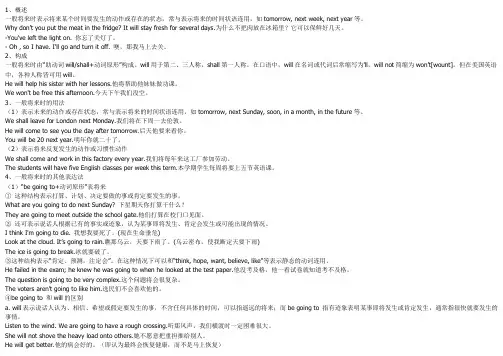
1、概述一般将来时表示将来某个时间要发生的动作或存在的状态,常与表示将来的时间状语连用,如tomorrow, next week, next year等。
Why don’t you put the meat in the fridge? It will stay fresh for several days.为什么不把肉放在冰箱里?它可以保鲜好几天。
-You've left the light on. 你忘了关灯了。
- Oh , so I have. I'll go and turn it off. 噢,那我马上去关。
2、构成一般将来时由“助动词will/shall+动词原形”构成。
will用于第二、三人称,shall第一人称。
在口语中,will在名词或代词后常缩写为'll,will not简缩为won’t[wount]。
但在美国英语中,各种人称皆可用will。
He will help his sister with her lessons.他将帮助他妹妹做功课。
We won't be free this afternoon.今天下午我们没空。
3、一般将来时的用法(1)表示未来的动作或存在状态,常与表示将来的时间状语连用,如tomorrow, next Sunday, soon, in a month, in the future等。
We shall leave for London next Monday.我们将在下周一去伦敦。
He will come to see you the day after tomorrow.后天他要来看你。
You will be 20 next year.明年你就二十了。
(2)表示将来反复发生的动作或习惯性动作We shall come and work in this factory every year.我们将每年来这工厂参加劳动。
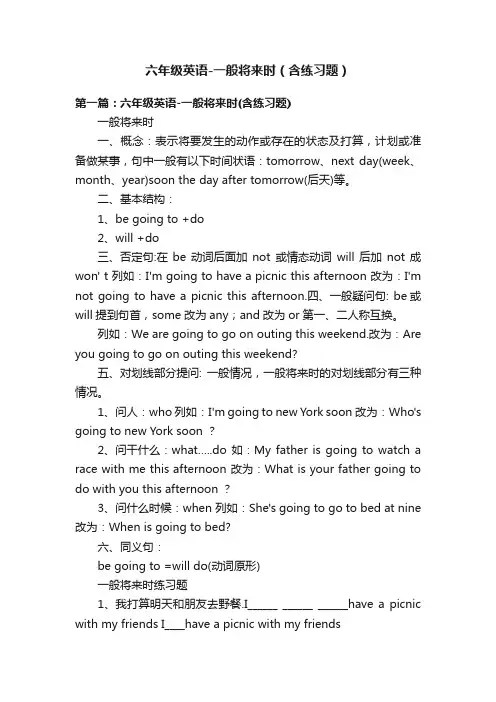
六年级英语-一般将来时(含练习题)第一篇:六年级英语-一般将来时(含练习题)一般将来时一、概念:表示将要发生的动作或存在的状态及打算,计划或准备做某事,句中一般有以下时间状语:tomorrow、next day(week、month、year)soon the day after tomorrow(后天)等。
二、基本结构:1、be going to +do2、will +do三、否定句:在be动词后面加not或情态动词will后加not成won' t 列如:I'm going to have a picnic this afternoon 改为:I'm not going to have a picnic this afternoon.四、一般疑问句: be或will提到句首,some改为any;and改为or第一、二人称互换。
列如:We are going to go on outing this weekend.改为:Are you going to go on outing this weekend?五、对划线部分提问: 一般情况,一般将来时的对划线部分有三种情况。
1、问人:who 列如:I'm going to new York soon 改为:Who's going to new York soon ?2、问干什么:what…..do 如:My father is going to watch a race with me this afternoon 改为:What is your father going to do with you this afternoon ?3、问什么时候:when 列如:She's going to go to bed at nine 改为:When is going to bed?六、同义句:be going to =will do(动词原形)一般将来时练习题1、我打算明天和朋友去野餐.I______ ______ ______have a picnic with my friends I____have a picnic with my friends2、你妈妈这个周末去购物吗?是,她要去买些水果。
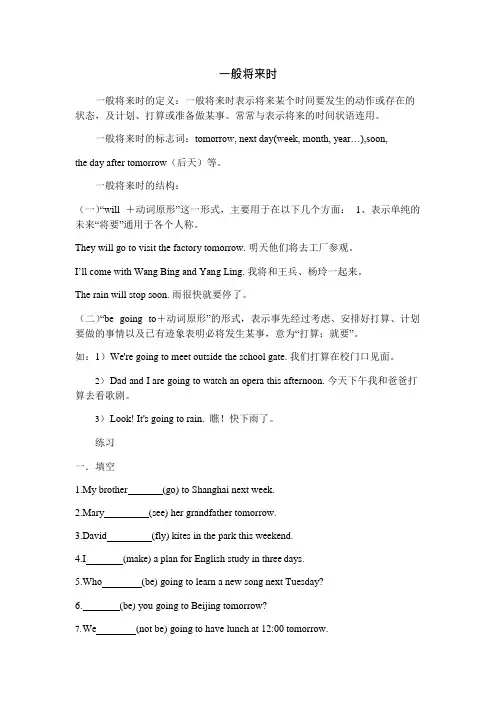
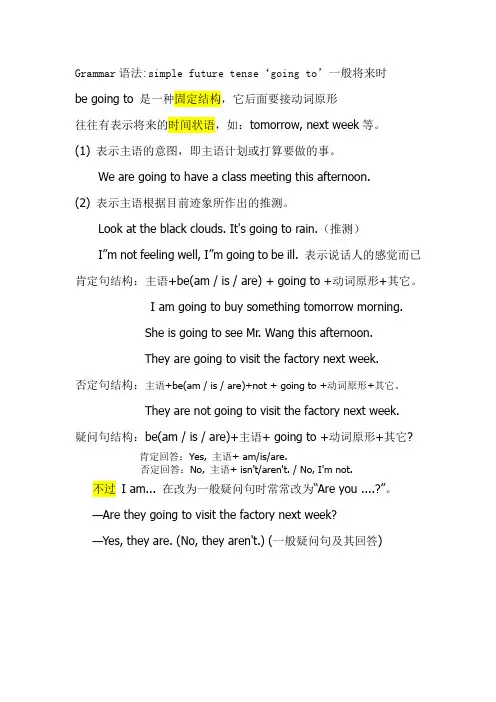
Grammar语法:simple future tense‘going to’一般将来时be going to 是一种固定结构,它后面要接动词原形往往有表示将来的时间状语,如:tomorrow, next week等。
(1) 表示主语的意图,即主语计划或打算要做的事。
We are going to have a class meeting this afternoon.(2) 表示主语根据目前迹象所作出的推测。
Look at the black clouds. It's going to rain.(推测)I”m not feeling well, I”m going to be ill. 表示说话人的感觉而已肯定句结构:主语+be(am / is / are) + going to +动词原形+其它。
I am going to buy something tomorrow morning.She is going to see Mr. Wang this afternoon.They are going to visit the factory next week.否定句结构:主语+be(am / is / are)+not + going to +动词原形+其它。
They are not going to visit the factory next week.疑问句结构:be(am / is / are)+主语+ going to +动词原形+其它?肯定回答:Yes, 主语+ am/is/are.否定回答:No, 主语+ isn't/aren't. / No, I'm not.不过I am... 在改为一般疑问句时常常改为“Are you ....?”。
—Are they going to visit the factory next week?—Yes, they are. (No, they aren't.) (一般疑问句及其回答)be going to 的特殊用法(1)There be 句型的be going to 结构为:There is / are going to be...(注意句型中going to 后面的be不能改为have。
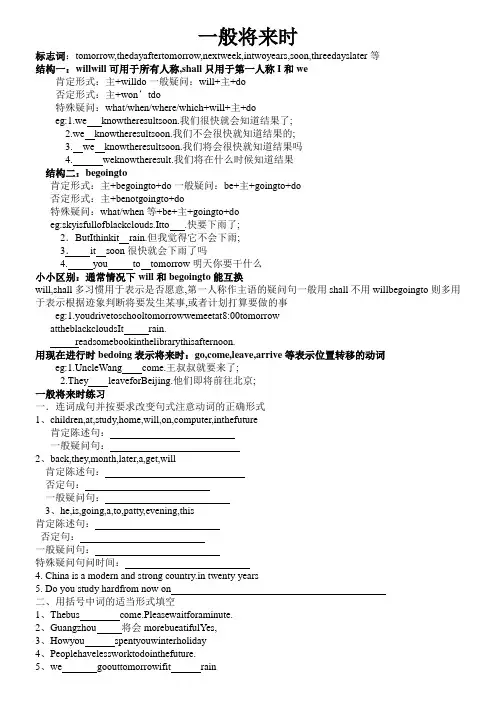
一般将来时标志词:tomorrow,thedayaftertomorrow,nextweek,intwoyears,soon,threedayslater等结构一:willwill可用于所有人称,shall只用于第一人称I和we肯定形式:主+willdo一般疑问:will+主+do否定形式:主+won’tdo特殊疑问:what/when/where/which+will+主+doeg:1.we knowtheresultsoon.我们很快就会知道结果了;2.we knowtheresultsoon.我们不会很快就知道结果的;3. we knowtheresultsoon.我们将会很快就知道结果吗4. weknowtheresult.我们将在什么时候知道结果结构二:begoingto肯定形式:主+begoingto+do一般疑问:be+主+goingto+do否定形式:主+benotgoingto+do特殊疑问:what/when等+be+主+goingto+doeg:skyisfullofblackclouds.Itto .快要下雨了;2.ButIthinkit rain.但我觉得它不会下雨;3.it soon很快就会下雨了吗4. you to tomorrow明天你要干什么小小区别:通常情况下will和begoingto能互换will,shall多习惯用于表示是否愿意,第一人称作主语的疑问句一般用shall不用willbegoingto则多用于表示根据迹象判断将要发生某事,或者计划打算要做的事eg:1.youdrivetoschooltomorrowwemeetat8:00tomorrowattheblackcloudsIt rain.readsomebookinthelibrarythisafternoon.用现在进行时bedoing表示将来时:go,come,leave,arrive等表示位置转移的动词eg:1.UncleWang come.王叔叔就要来了;2.They leaveforBeijing.他们即将前往北京;一般将来时练习一.连词成句并按要求改变句式注意动词的正确形式1、children,at,study,home,will,on,computer,inthefuture肯定陈述句:一般疑问句:2、back,they,month,later,a,get,will肯定陈述句:否定句:一般疑问句:3、he,is,going,a,to,patty,evening,this肯定陈述句:否定句:一般疑问句:特殊疑问句问时间:4. China is a modern and strong country.in twenty years5. Do you study hardfrom now on二、用括号中词的适当形式填空1、Thebus come.Pleasewaitforaminute.2、Guangzhou 将会morebueatifulYes,3、Howyou spentyouwinterholiday4、Peoplehavelessworktodointhefuture.5、we goouttomorrowifit rain三、选择正确的答案1. Thereanimportantmeetingnextweek.A.willbeB.willhaveC.willhasD.willgoingtobe2. toEnglandtomorrow.A.flyB.flewC.isflyingD.flies3. Marywillcomebackfiveo’ter4. yougototheparktomorrowA.WillB.ShallC.DoD.Are5. . The day after tomorrow they ________ a volleyball match.A. will watchingB. watchesC. is watchingD. is going to watch6. .There ________ a birthday party this Sunday.A. shall beB. will beC. shall going to beD. will going to be7. They ________ an English evening next Sunday.A. are havingB. are going to haveC. will havingD. is going to have8. ________ you ________ free next Sunday A. Will; areB. Will; be C. Do; be D. Are; be9. He ________ there at ten tomorrow morning. A. willB. Is C. will beD. be10. ________ your brother ________ a magazine from the libraryA. Are; going to borrowB. Is; going to borrowC. Will; borrowsD. Are; going to borrows作业:一、单项选择;1. There __________ a meeting tomorrow afternoon.A. will be going toB. will going to beC. is going to beD. will go to be2. Charlie ________ here next month.A. isn’t workingB. doesn’t workingC. isn’t going to workingD. won’t work3. He ________ very busy this week, he ________ free next week.A. will be; isB. is; isC. will be; will beD. is; will be4. There ________ a dolphin show in the zoo tomorrow evening.A. wasB. is going to haveC. will haveD. is going to be5.–________ you ________ free tomorrow – No. I ________ free the day after tomorrow.A. Are; going to; willB. Are; going to be; willC. Are; going to; will beD. Are; going to be; will be6. Mother ________ me a nice present on my next birthday.A. will givesB. will giveC. givesD. give7. – Shall I buy a cup of tea for you–________. 不,不要;A. No, you won’t.B. No, you aren’. No, please don’t.D. No, please.8. – Where is the morning paper – I ________ if for you at once.A. getB. am gettingC. to getD. will get二、动词填空;1. I ______leavein a minute. I ______finishall my work before I ______ leave.2. —How long _____ you _____studyin our country—I _____planto be here for about one more year.—What ______ you ______doafter you ______leavehere—I ______returnhome and ______geta job.3. I ______betired. I ______goto bed early tonight.4. Mary’s birthday is next Monday, her mother _____giveher a present.三、句型转换;1. People in the north often go skating in winter. next winter2. There are two cinemas in that town. next year3. He comes back late.in two days4.She is a conductor of a train.soon。
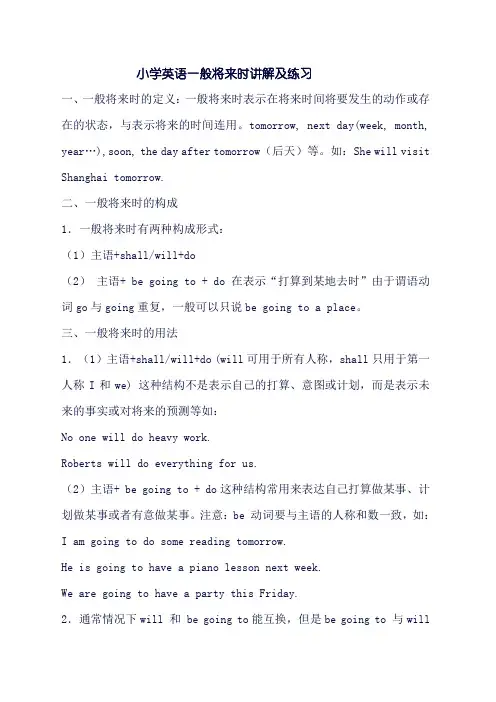
小学英语一般将来时讲解及练习一、一般将来时的定义:一般将来时表示在将来时间将要发生的动作或存在的状态,与表示将来的时间连用。
tomorrow, next day(week, month, year…),soon, the day after tomorrow(后天)等。
如:She will visit Shanghai tomorrow.二、一般将来时的构成1.一般将来时有两种构成形式:(1)主语+shall/will+do(2)主语+ be going to + do 在表示“打算到某地去时”由于谓语动词go与going重复,一般可以只说be going to a place。
三、一般将来时的用法1.(1)主语+shall/will+do (will可用于所有人称,shall只用于第一人称I和we) 这种结构不是表示自己的打算、意图或计划,而是表示未来的事实或对将来的预测等如:No one will do heavy work.Roberts will do everything for us.(2)主语+ be going to + do这种结构常用来表达自己打算做某事、计划做某事或者有意做某事。
注意:be 动词要与主语的人称和数一致,如:I am going to do some reading tomorrow.He is going to have a piano lesson next week.We are going to have a party this Friday.2.通常情况下will 和 be going to能互换,但是be going to 与will用法的也是有点区别的(1)只用will不用be going to的情况:①表示对未来时间与年龄的推测时,如:Tomorrow will be Monday.She will be thirteen next year.②表示必然发生时,如:Fish will die without water.People will die if all green plants die.(2)只用be going to而不用will的情况:如果表示已有迹象表明在不久的将来要发生的事情时,如:Look at those black clouds, It’s going to rain.3.某些动词如:go/come/leave/start/begin/arrive等,它们的现在进行时可以表示将来时,如:They are leaving for Shanghaitomorrow.My brother is coming here soon.四、一般将来时的句式变换肯定句:主语+shall/will+do主语+ be going to + do否定句:主语+shall/will+not+do(will not 可缩写成won’t)主语+ be+ not+ going to +do一般疑问句:shall/will+主语+ dobe+主语+going to+do特殊疑问句:疑问词+ shall/will+主语+do疑问词+be+主语+going to+do一般将来时练习题:一、用单词的适当形式填空。
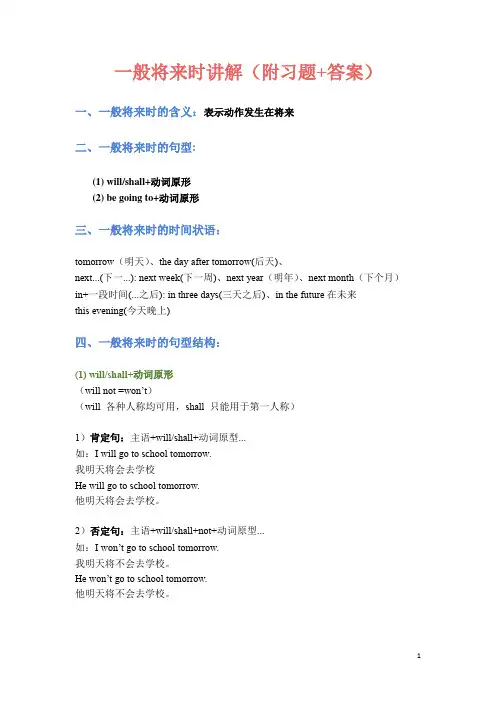
一般将来时讲解(附习题+答案)一、一般将来时的含义:表示动作发生在将来二、一般将来时的句型:(1) will/shall+动词原形(2) be going to+动词原形三、一般将来时的时间状语:tomorrow(明天)、the day after tomorrow(后天)、next...(下一...): next week(下一周)、next year(明年)、next month(下个月)in+一段时间(...之后): in three days(三天之后)、in the future在未来this evening(今天晚上)四、一般将来时的句型结构:(1) will/shall+动词原形(will not =won’t)(will 各种人称均可用,shall 只能用于第一人称)1)肯定句:主语+will/shall+动词原型...如:I will go to school tomorrow.我明天将会去学校He will go to school tomorrow.他明天将会去学校。
2)否定句:主语+will/shall+not+动词原型...如:I won’t go to school tomorrow.我明天将不会去学校。
He won’t go to school tomorrow.他明天将不会去学校。
3)一般疑问句:Will/Shall +主语+动词原型...如:Will you go to school tomorrow?你明天要去学校吗?Will he go to school tomorrow?他明天要去学校吗?肯定回答:Yes, 主语+will.如:Yes, I will.Yes, he will.否定回答:No,主语+will+not.如:No, I won’t.No, he won’t.4) 特殊疑问句:特殊疑问词+will/shall+主语+动词原型...如:What will you do tomorrow?你明天将会做什么?What will he do tomorrow?他明天将会做什么?(2) be going to+动词原形1)肯定句:主语+be going to +动词原型...如:I am going to buy some books tomorrow.我明天打算去买一些书。
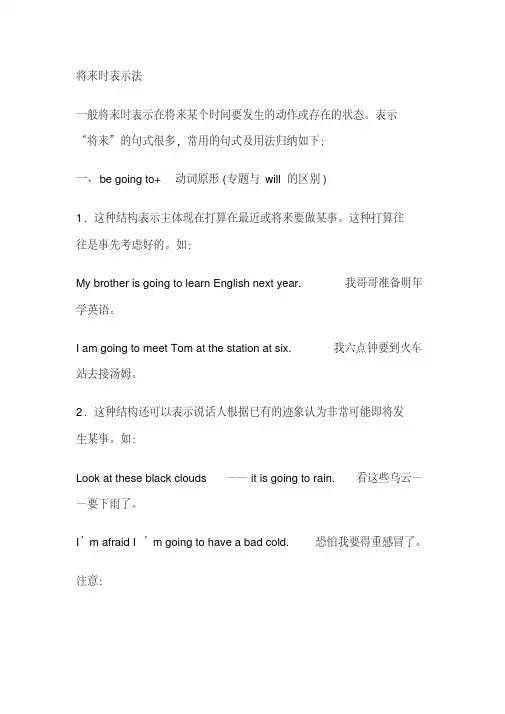
将来时表示法一般将来时表示在将来某个时间要发生的动作或存在的状态。
表示“将来”的句式很多,常用的句式及用法归纳如下:一、be going to+动词原形(专题与will的区别)1.这种结构表示主体现在打算在最近或将来要做某事。
这种打算往往是事先考虑好的。
如:My brother is going to learn English next year. 我哥哥准备明年学英语。
I am going to meet Tom at the station at six. 我六点钟要到火车站去接汤姆。
2.这种结构还可以表示说话人根据已有的迹象认为非常可能即将发生某事。
如:Look at these black clouds——it is going to rain. 看这些乌云——要下雨了。
I’m afraid I’m going to have a bad cold. 恐怕我要得重感冒了。
注意:1. 如果be going to后接的是形容词或副词(there)时,其后应加上be,然后再接形容词或副词。
如:I’m going to be busy this Sunday. 这个星期天我很忙2. there be句型也可用于这种句型中,但there不能和have连用。
如:There is going to be an English film this evening. 今天晚上有一场英文电影。
二、shall/ will+动词原形。
在书面语中,第一人称常用shall, 但在口语中,所有人称都可用will.1.will/ shall均可表示单纯的将来。
如:The radio says it will be cloudy tomorrow. 收音机报道明天多云。
2.表示预料中将要发生的动作或情况。
如:You’ll feel better after having this medicine.吃了这药,你就会感到好些的。
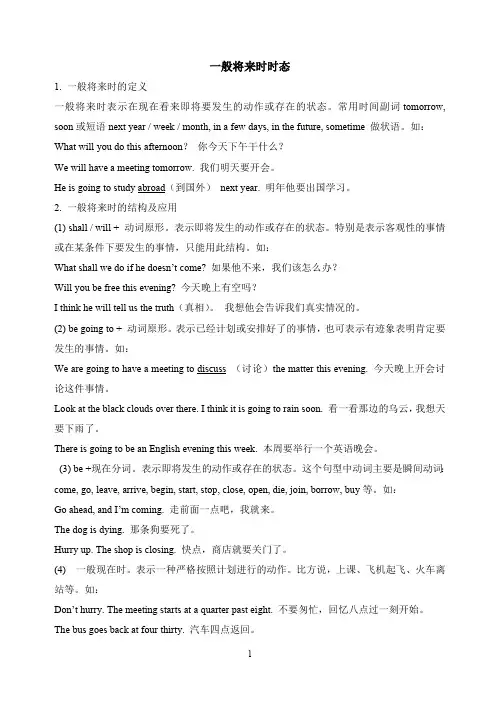
一般将来时时态1. 一般将来时的定义一般将来时表示在现在看来即将要发生的动作或存在的状态。
常用时间副词tomorrow, soon或短语next year / week / month, in a few days, in the future, sometime 做状语。
如:What will you do this afternoon?你今天下午干什么?We will have a meeting tomorrow. 我们明天要开会。
He is going to study abroad(到国外)next year. 明年他要出国学习。
2. 一般将来时的结构及应用(1) shall / will + 动词原形。
表示即将发生的动作或存在的状态。
特别是表示客观性的事情或在某条件下要发生的事情,只能用此结构。
如:What shall we do if he doesn’t come? 如果他不来,我们该怎么办?Will you be free this evening? 今天晚上有空吗?I think he will tell us the truth(真相)。
我想他会告诉我们真实情况的。
(2) be going to + 动词原形。
表示已经计划或安排好了的事情,也可表示有迹象表明肯定要发生的事情。
如:We are going to have a meeting to discuss (讨论)the matter this evening. 今天晚上开会讨论这件事情。
Look at the black clouds over there. I think it is going to rain soon. 看一看那边的乌云,我想天要下雨了。
There is going to be an English evening this week. 本周要举行一个英语晚会。
(3) be +现在分词。
表示即将发生的动作或存在的状态。
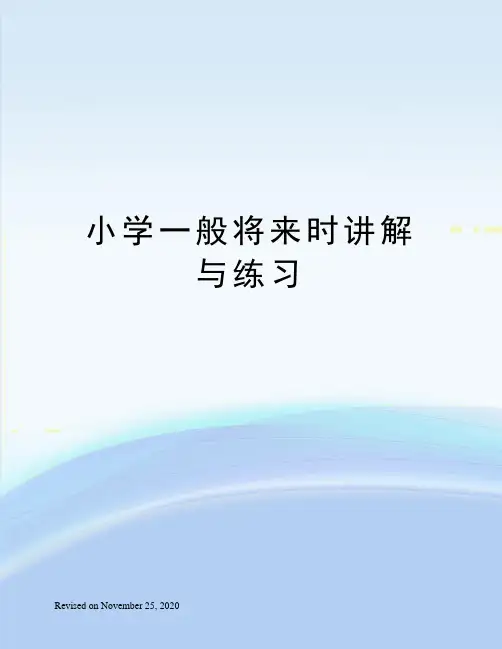
小学一般将来时讲解与练习Revised on November 25, 2020小学一般将来时一般将来时的定义:一般将来时表示在将来时间将要发生的动作或存在的状态,与表示将来的时间连用。
tomorrow,nextday(week,month,year…),soon,thedayaftertomorrow(后天)等。
(一)一般将来时有两种构成形式:be going to+动词原形=will +动词原形一、肯定句:1.主语+shall/will+动词原形+其它2.主语+be(am,is ,are)goingto+动词原形+其它I’m going to clean my bedroom tomorrow.二、否定句:主语+be (am,is,are)not going to +动词原形+其它主语+shall/will not +动词原形+其它 will not= won’tJim is not going to play football.Jim will not play football.三、一般疑问句:be (am/is/are)/will+主语+going to+动词原形+其它肯定回答: Yes,主语+will否定回答: No,主语+won’tIs Jim going to play football Yes, he will/ No, he won’tWill Jim going to play football四、疑问句:疑问词+be (am/is/are)动词+主语+going to+(动作)+( 其它)They are going to ride a bike.What are they going to doWhat is he going to doHe is going to ski.(二)、一般将来时的用法一.will用于所有人称,shall用于第一人称()二.will常简略为'll,并与主语连写在一起,如:I'll,he'll,it'll,we'll,you'll,they'll。
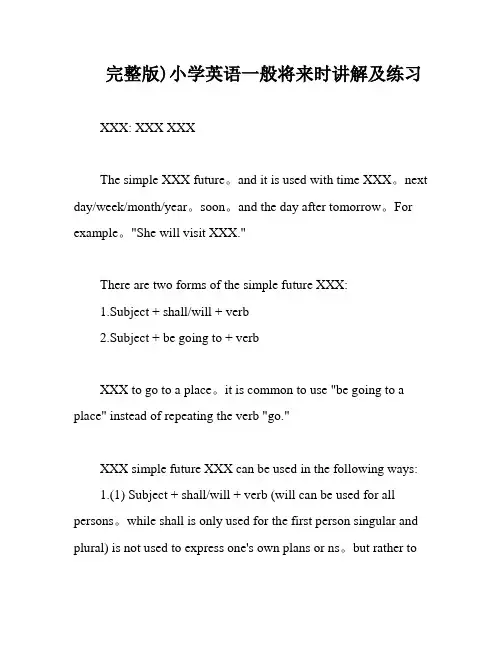
完整版)小学英语一般将来时讲解及练习XXX: XXX XXXThe simple XXX future。
and it is used with time XXX。
next day/week/month/year。
soon。
and the day after tomorrow。
For example。
"She will visit XXX."There are two forms of the simple future XXX:1.Subject + shall/will + verb2.Subject + be going to + verbXXX to go to a place。
it is common to use "be going to a place" instead of repeating the verb "go."XXX simple future XXX can be used in the following ways:1.(1) Subject + shall/will + verb (will can be used for all persons。
while shall is only used for the first person singular and plural) is not used to express one's own plans or ns。
but rather tostate XXX。
such as "No one will do heavy work" and "Roberts will do everything for us."2) Subject + be going to + verb is often used to express one's own plans。
it'll,we'll,you'll,they'll。
'll,并与主语连写在一起,如:I'll,he'll,注:will 常简略为一、定义:表示将要发生的动作或存在的状态及打算、计划或准备做某事。
二、基本构成:①be going to +do.打算做某事一般将来时态:eg:I’m going to be a singer.我打算成为一名歌手。
She is going to learnEnglish.她打算去学习英语。
②will /shall +动词原形这种方法一般单纯地表示将来某个时间将要发生的动作或存在的状态。
will 用于各种人称;shall 只用于第一人称。
eg:I will /shall go to visit him next week.下周我将去拜访他。
What time shall we go there tomorrow?明天我们几点去那儿?③否定句:在be动词(am,is,are)后加not或情态动词will后加not构成won’t。
例如:I’m going to have a picnic this afternoon.→I’m not going to have a picnic this afternoon.④一般疑问句:be或will提到句首,some改为any,and改为or,第一二人称互换。
例如:We are going to go shopping this weekend.→Are you going to go shopping this weekend?⑤对划线部分提问:一般情况,一般将来时的对划线部分有三种情况。
1、问人。
Who例如:I’m going to New York soon.→Who’s going to New York soon?2、问干什么。
What…do例如:My father is going to watch football games with methis afternoon.→What is your father going to do with you this afternoon?3、问什么时候。
六年级一般将来时练习(一)be(am, is ,are)going to =will 翻译为“将;将要”一、概念:表示将要发生的动作或存在的状态句中一般有以下时间状语:tonight,in the future,tomorrow, next day(week, month, year),soon, the day after tomorrow(后天),this morning,this afternoon二、基本结构:①主语+be going to + do;②主语+will+ do.三、否定句:在①be动词(am, is, are)后加not.I’m going to have a picnic this afternoon. →I’m not going to have a picnic this afternoon.四、对划线部分提问。
一般情况,一般将来时的对划线部分有三种情况。
1. 问人WhoI’m going to go to New York soon. →Who is going to go to New York soon? 2. 问干什么What …do.My father is going to watch a match with me this afternoon.→What is your father going to do with you this afternoon?3. 问什么时候When.She is going to go to bed at nine. →When is she going to go to bed?五、同义句:be going to = willI am going to go swimming tomorrow. = I will go swimming tomorrow.一、完成句子。
1. 我打算明天和朋友去野炊。
I_____ _______ _________ have a picnic with my friends.=I ________ have a picnic with my friends.2. 下个星期一你打算去干嘛? 我想去打篮球。
一般将来时讲解及练习(含答案)一、单项选择一般将来时1.— Mr. Gordon asked me to remind you of the meeting this afternoon. Don't you forget it!— Ok, I .A.won't B.don't C.will D.do【答案】A【解析】试题分析:考查时态。
句意:—戈登先生要求我提醒他今天下午要开会。
你千万别忘记了!—好的,我不会忘记的。
根据句意说明使用否定式,而且是说明的以后的事情,要使用将来时。
故A正确。
考点:考查时态2.—Did you tell your parents about the result?—Oh, no, I forgot. I them now.A.will be calling B.will call C.am going to tell D.am to call【答案】B【解析】句意:A 选项是将来进行时,表示将来某个时间正在进行的动作;B、C、D均表示一般将来时。
will+v原形表示临时决定的;而be going to do和be to do是表示按计划或安排要做的事。
根据语境可知说话人是经别人提醒才临时想起要把结果告诉他父母,所以应该用will+v原形。
句意:--你告诉你父母结果了吗?--没有,我忘了。
我现在就去告诉他们。
试题分析:考查动词时态。
考点:考查动词时态。
3.If my brother doesn’t go to the evening party, .A.neither do I B.I will either C.either will I D.nor will I【答案】D【解析】试题分析:考查倒装句:句意:如果我弟弟不去晚会,我也不去。
Neither/Nor+倒装句,表示“…也不是”,因为if条件句用一般现在时,代替一般将来时,所以主句是一般将来时,选D。
一般将来时讲解+练习题一般将来时练习题知识要点一般将来时一、概念:表示将要发生的动作或存在的状态及打算、计划或准备做某事。
时间状语:tomorrow, the day after tomorrow(后天),this morning/ afternoon/ evening/weekend, next day (week, month, year…), soon, one day(将来某天),in+一段时间,in the future.等二、基本结构:①be(am/is/are) going to +动词原形;②will+ 动词原形.(1) be (am/is/are) going to +动词原形,表示主语将要进行某一行动的打算、意图,“打算干什么”。
如:I am going to play basketball with my friends this afternoon(2) be (am/is/are) going to +(the) 地点名词,表示“准备去…”。
如:I am going to Beijing/ the zoo with my mum this weekend.(3) be (am/is/are) going to 结构,可表示说话人确信如此或某种迹象表明某事即将发生如: Look at those clouds! It’s going to rain.注意:be going to 与will一般情况下可以互相替换。
以下情况不可替换:(1)在表示身体不适(sick等)的句子中, 只可用be going to。
(2)表示某种迹象表明某事即将发生(如天气变化)时,只可用be going to 如:I am going to go swimming tomorrow. (同义句) = I will go swimming tomorrow.(1) I am going to be sick by cable car/ be ill (have a fever ) in the rain.(2) Look at those clouds! It’s going to rain.三、一般将来时的句型变化:1.肯定句:主语+ be(am/is/are) going to +动词原形或主语+ will + 动词原形. +动词原形否定句: (1)在be动词(am, is, are)后加not (2)情态动词will后加not成won’t. Eg:I’m going to have a picnic this afternoon.→ I’m not going to…..I will have a picnic this afternoon. → I will not (won’t) …2.2.一般疑问句:一调二改三问号(1)be或will调到句首(2)第一二人称互换:I/we – you;and改为or(否定与疑问句);some改为any;例如:We are going to buy some food and fruit this weekend. 或We will buy some…Are you going to buy any food or fruit this weekend? 或Will you buy any…? 3.特殊疑问句:who, what, where, when, how等特殊疑问词。
【英语】一般将来时知识点梳理及经典练习(超详细)(1)一、一般将来时1.We____ shopping unless it ____ tomorrow.A. will go, will rainB. go, will rainC. will go, rainsD. go, rains【答案】C【解析】【分析】句意:除非明天下雨,否则我们将会去购物。
unless 除非,引导条件状语从句,从句中应该用一般现在时表示将来,主句用一般将来时。
故应选C。
【点评】考查动词时态。
2.—Do you know when Mrs. White for dinner this evening?—No, but I think she when she is free.A. will come; will comeB. will come; comesC. comes; will come【答案】 A【解析】【分析】句意:——你知道怀特太太今晚是否来吃晚饭吗?——不知道。
但我认为如果她有空,她会来。
空一,句子为含有宾语从句的主从复合句,主句是一般现在时,从句用它所需要的任何时态,根据this evening今晚,可知句子为一般将来时,will come;空二,回答是when引导的时间状语从句,从句是一般现在时,主句应用将来时,will come,故选A。
【点评】此题考查从句的时态。
3.Look on the bright side of life,and imagine that you ______ a happy and successful future.A. hadB. will haveC. haveD. have had【答案】 B【解析】【分析】考查时态.句意"看看生活中美好的一面,想象你会有一个幸福和成功的未来.".A过去时.B一般将来时态.C动词原形.D现在完成时态.结合语境"看看生活中美好的一面,想象你___一个幸福和成功的未来.",由future未来,可知,表示将来,用一般将来时态.答案是B.4.— There ________a football match on TV tonight. I can't wait to watch it.— Me, too. It's ________ Guangzhou Evergrande and the Australian team Melbourne Victory.A. will be; betweenB. will be; bothC. will have; betweenD. will have; both【答案】A【解析】【分析】句意为:---今晚将有一场电视直播足球比赛,我非常想看。
小学英语一般将来时讲解及练习一、一般将来时的定义:一般将来时表示在将来时间将要发生的动作或存在的状态,与表示将来的时间连用。
tomorrow, next day(week, month, year…),soon, the day after tomorrow(后天)等。
如:She will visit Shanghai tomorrow.二、一般将来时的构成1.一般将来时有两种构成形式:(1)主语+shall/will+do(2)主语+ be going to + do 在表示“打算到某地去时”由于谓语动词go与going重复,一般可以只说be going to a place。
三、一般将来时的用法1.(1)主语+shall/will+do (will可用于所有人称,shall只用于第一人称I和we) 这种结构不是表示自己的打算、意图或计划,而是表示未来的事实或对将来的预测等如:No one will do heavy work.Roberts will do everything for us.(2)主语+ be going to + do这种结构常用来表达自己打算做某事、计划做某事或者有意做某事。
注意:be 动词要与主语的人称和数一致,如:I am going to do some reading tomorrow.He is going to have a piano lesson next week.We are going to have a party this Friday.2.通常情况下will 和be going to能互换,但是be going to 与will 用法的也是有点区别的(1)只用will不用be going to的情况:①表示对未来时间与年龄的推测时,如:Tomorrow will be Monday.She will be thirteen next year.②表示必然发生时,如:Fish will die without water.People will die if all green plants die.(2)只用be going to而不用will的情况:如果表示已有迹象表明在不久的将来要发生的事情时,如:Look at those black clouds, It’s going to rain.3.某些动词如:go/come/leave/start/begin/arrive等,它们的现在进行时可以表示将来时,如:They are leaving for Shanghaitomorrow.My brother is coming here soon.四、一般将来时的句式变换肯定句:主语+shall/will+do主语+ be going to + do否定句:主语+shall/will+not+do(will not 可缩写成won’t)主语+ be+ not+ going to +do一般疑问句:shall/will+主语+ dobe+主语+going to+do特殊疑问句:疑问词+ shall/will+主语+do疑问词+be+主语+going to+do一般将来时练习题:一、用单词的适当形式填空。
1. I _______ ________ _______ _______ (see) a film tomorrow.2. A: What _______ you _______ ______ _______ (do) next Saturday?B: I _______ __________ _______ ________(swim) with my parents.3. There ______ _______ (be) a party in our school.4. Mike _______ ________ (visit ) his grandparents next week.5. He ______ ______ _______ _______(buy)a bike the day after tomorrow.6. ________ (fly)a kite with my father next week.7. He will not _________ (go) school tomorrow.二、选择题( ) 1. There __________ a meeting tomorrow afternoon.A. will be going toB. will going to beC. is going to beD. will go to be( ) 2. Charlie ________ here next month.A. isn’t workingB. doesn’t workingC. isn’t going to workingD. won’t work( ) 3. He ________ very busy this week, he ________ free next week.A. will be; isB. is; isC. will be; will beD. is; will be( ) 4. There ________ a dolphin show in the zoo tomorrow evening.A. wasB. is going to haveC. will haveD. is going to be( ) 5. –________ you ________ free tomorrow?–No. I ________ free the day after tomorrow.A. Are; going to; willB. Are; going to be; willC. Are; going to; will beD. Are; going to be; will be( ) 6. Mother ________ me a nice present on my next birthday.A. will givesB. will giveC. givesD. give( ) 7. – Shall I buy a cup of tea for you?–________. (不,不要。
)A. No, you won’t.B. No, you aren’t.C. No, please don’t.D. No, please.( ) 8. – Where is the morning paper?–I ________ if for you at once.A. getB. am gettingC. to getD. will get( ) 9. ________ a concert next Saturday?A. There will beB. Will there beC. There can beD. There are( ) 10. If they come, we ________ a meeting.A. haveB. will haveC. hadD. would have( ) 11. He ________ her a beautiful hat on her next birthday.A. givesB. gaveC. will givingD. is going to giving ( ) 12. He ________ to us as soon as he gets there.A. writesB. has writtenC. will writeD. wrote( ) 13. He ________ in three days.A. coming backB. came backC. will come backD. is going to coming back ( ) 14. If it ________ tomorrow, we’ll go roller-skating.A. isn’t rainB. won’t rainC. doesn’t rainD. doesn’t fine( ) 15. – Will his parents go to see the Terra Cotta Warriors tomorrow?– No, ________ (不去).A. they willn’t.B. they won’t.C. they aren’t.D. they don’t.( ) 16. Who ________ we ________ swimming with tomorrow afternoon?A. will; goB. do; goC. will; goingD. shall; go( ) 17. We ________ the work this way next time.A. doB. will doC. going to doD. will doing( ) 18. Tomorrow he ________ a kite in the open air first, and then ________ boating in the park.A. will fly; will goB. will fly; goesC. is going to fly; will goesD. flies; will go ( ) 19. The day after tomorrow they ________ a volleyball match.A. will watchingB. watchesC. is watchingD. is going to watch ( ) 20. There ________ a birthday party this Sunday.A. shall beB. will beC. shall going to beD. will going to be( ) 21. They ________ an English evening next Sunday.A. are havingB. are going to haveC. will havingD. is going to have ( ) 22. ________ you ________ free next Sunday?A. Will; areB. Will; beC. Do; beD. Are; be( ) 23. He ________ there at ten tomorrow morning.A. willB. isC. will beD. be( ) 24. ________ your brother ________ a magazine from the library?A. Are; going to borrowB. Is; going to borrowC. Will; borrowsD. Are; going to borrows ( ) 25. – Shall I come again tomorrow afternoon?–________ (好的).A. Yes, pleaseB. Yes, you will.C. No, please.D. No, you won’t.( ) 26. It ________ the year of the horse next year.A. is going to beB. is going toC. will beD. will is( ) 27. ________ open the window?A. Will you pleaseB. Please will youC. You pleaseD. Do you( ) 28. – Let’s go out to play football, shall we?– OK. I ________.A. will comingB. be going to comeC. comeD. am coming( ) 29. It ________ us a long time to learn English well.A. takesB. will takeC. spendsD. will spend( ) 30. The train ________ at 11.A. going to arriveB. will bearriveC. is going toD. is arriving“”“”At the end, Xiao Bian gives you a passage. Minand once said, "people who learn to learn are very happy people.". In every wonderful life, learning is an eternal theme. As a professional clerical and teaching position, I understand the importance of continuous learning, "life is diligent, nothing can be gained", only continuous learning can achieve better self. Only by constantly learning and mastering the latest relevant knowledge, can employees from all walks of life keep up with the pace of enterprise development and innovate to meet the needs of the market. This document is also edited by my studio professionals, there may be errors in the document, if there are errors, please correct, thank you!。